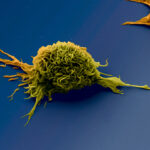Lien vers Pubmed [PMID] – 31759429
Lien DOI – 10.1016/bs.ircmb.2019.08.002
Int Rev Cell Mol Biol 2019 ; 349(): 1-54
Classical dendritic cells (cDCs) are mononuclear phagocytes of hematopoietic origin specialized in the induction and regulation of adaptive immunity. Initially defined by their unique T cell activation potential, it became quickly apparent that cDCs would be difficult to distinguish from other phagocyte lineages, by solely relying on marker-based approaches. Today, cDCs definition increasingly embed their unique ontogenetic features. A growing consensus defines cDCs on multiple criteria including: (1) dependency on the fms-like tyrosine kinase 3 ligand hematopoietic growth factor, (2) development from the common DC bone marrow progenitor, (3) constitutive expression of the transcription factor ZBTB46 and (4) the ability to induce, after adequate stimulation, the activation of naïve T lymphocytes. cDCs are a heterogeneous cell population that contains two main subsets, named type 1 and type 2 cDCs, arising from divergent ontogenetic pathways and populating multiple lymphoid and non-lymphoid tissues. Here, we present recent knowledge on the cellular and molecular pathways controlling the specification and commitment of cDC subsets from murine and human hematopoietic stem cells.

